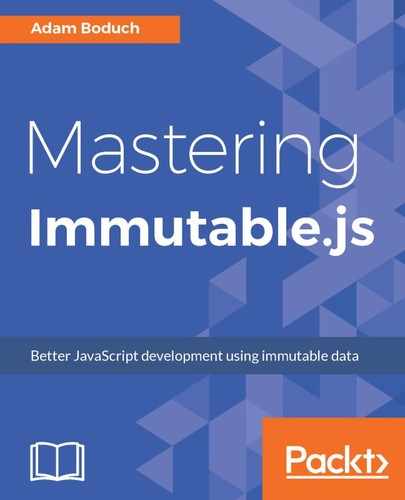Let's revisit the earlier example where we mapped a list of names. We'll do the same thing here, except that we'll add the resulting string to each map as a new key-value pair:
const capitalize = s =>
`${s.charAt(0).toUpperCase()}${s.slice(1)}`;
const myList = List.of(
Map.of('first', 'joe', 'last', 'brown', 'age', 45),
Map.of('first', 'john', 'last', 'smith', 'age', 32),
Map.of('first', 'mary', 'last', 'wise', 'age', 56)
);
const myMappedList = myList.map(
v => v.set('name', [
capitalize(v.get('first')),
capitalize(v.get('last'))
].join(' '))
);
console.log('myList', myList.toJS());
// -> myList [ { first: 'joe', last: 'brown', age: 45 },
// -> { first: 'john', last: 'smith', age: 32 },
// -> { first: 'mary', last: 'wise', age: 56 } ]
console.log('myMappedList', myMappedList.toJS());
// -> myMappedList [ { first: 'joe', last: 'brown', age: 45, name: 'Joe Brown' },
// -> { first: 'john', last: 'smith', age: 32, name: 'John Smith' },
// -> { first: 'mary', last: 'wise', age: 56, name: 'Mary Wise' } ]
Instead of returning the resulting string from our map() iteratee, we're returning a new map instance by calling set(). The new list of maps each have a name key now.
This type of mapping is useful if you already have code that processes lists of maps and it expects a name key. You can easily add the key rather than change the list processing code.
